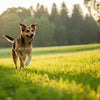Why Do Dogs Gain Weight After Being Fixed? Understanding the Impact of Neutering on Pet Weight
- Houndsy
Table of Contents
- Introduction
- Understanding Neutering and Its Effects on Hormones
- Behavioral Changes Post-Neutering
- Practical Tips for Managing Weight in Neutered Dogs
- Common Misconceptions About Neutering and Weight Gain
- Conclusion
- FAQ
Introduction
Did you know that neutered pets are statistically more likely to be overweight than their unneutered counterparts? According to recent studies, neutered dogs can be up to three times more likely to become overweight, particularly within the first two years following their surgery. This is a pressing concern for many pet owners who want to ensure their furry companions maintain a healthy weight and lifestyle.
As responsible pet owners, we strive to provide the best care for our dogs, which includes understanding the potential effects of neutering on their health. This blog post will delve into the reasons behind weight gain after dogs are fixed, exploring the hormonal changes that occur, the impact on metabolism, and practical strategies to manage weight effectively. By the end of this article, we hope to empower you with knowledge and tools to keep your pet healthy and happy.
We will cover the following topics:
- The hormonal changes following neutering
- How these changes affect metabolism and appetite
- The relationship between neutering and lifestyle changes
- Practical tips to manage weight in neutered dogs
- Addressing common misconceptions about neutering and weight gain
So let’s embark on this journey together to understand why our beloved dogs may gain weight after being fixed and how we can proactively manage their health.
Understanding Neutering and Its Effects on Hormones
Neutering, or spaying and castrating, is a surgical procedure that removes the reproductive organs of pets. For female dogs, spaying involves removing the ovaries and uterus, while neutering male dogs involves removing the testes. One of the primary reasons for these procedures is to prevent unwanted litters and reduce certain health risks.
However, a significant side effect of these surgeries is the alteration of hormone levels in our pets. The removal of sex hormones such as estrogen and testosterone can lead to profound changes in a dog’s physiology, which, in turn, can affect their weight.
The Role of Hormones in Metabolism and Appetite
Hormones play a crucial role in regulating metabolism and appetite. After neutering, several hormonal changes occur that can lead to weight gain:
- Reduced Metabolism: Neutered pets often experience a decrease in metabolic rate. Research indicates that neutered dogs may have a reduced resting metabolic rate, meaning they burn fewer calories at rest. This can be attributed to the decline in sex hormones that help regulate metabolism.
- Increased Appetite: Following neutering, many pets experience an increase in appetite. The decrease in estrogen and testosterone can lead to a surge in hunger, prompting pets to seek more food, which can contribute to weight gain if not managed properly.
- Change in Energy Requirements: Studies suggest that neutered pets may require 20-30% fewer calories than their unneutered counterparts to maintain a healthy weight. Without adjusting their food intake post-surgery, pets can quickly gain weight.
Summary of Hormonal Changes
In summary, the hormonal changes that occur after neutering can significantly impact a dog's metabolism and appetite. A combination of a slower metabolism and increased hunger creates a perfect storm for potential weight gain.
Behavioral Changes Post-Neutering
While hormonal changes are a significant factor in weight gain, behavioral changes also play a crucial role. Neutering can lead to changes in a dog's activity levels, which can further influence weight management.
Reduced Activity Levels
One of the behavioral benefits of neutering is a decrease in certain aggressive and roaming behaviors, particularly in male dogs. However, this decrease in activity can lead to fewer calories being burned throughout the day. Without the urge to roam or engage in mating behaviors, neutered dogs may become less active, making it essential to encourage exercise and play.
The Importance of Regular Exercise
To combat the natural inclination towards weight gain, regular exercise becomes even more critical. Here are a few recommendations for ensuring your dog stays active post-neutering:
- Daily Walks: Aim for at least 30 minutes of walking each day. This can be divided into two shorter walks if needed.
- Playtime: Engage your dog in interactive play. Games like fetch can help stimulate both their mind and body.
- Mental Stimulation: Consider puzzle toys or training sessions that not only provide physical activity but also challenge your dog's intellect.
Summary of Behavioral Changes
In conclusion, neutering can lead to decreased activity levels in pets, which, combined with hormonal changes, increases the risk of weight gain. Encouraging regular exercise is essential to help maintain a healthy weight.
Practical Tips for Managing Weight in Neutered Dogs
Understanding the challenges that come with neutering is the first step in managing your dog's weight effectively. Here are some practical strategies we can adopt to help our furry friends maintain a healthy weight:
1. Adjust Caloric Intake
It’s crucial to adjust your pet's food intake after they are neutered. Since neutered dogs typically require fewer calories, we should work with our veterinarian to determine the appropriate caloric intake based on our dog's age, weight, and activity level.
2. Choose the Right Diet
Opting for a diet specifically formulated for neutered pets can make a significant difference. These diets are often lower in fat and calories, ensuring that our pets receive the necessary nutrients without the extra calories.
3. Monitor Portion Sizes
Using a measuring cup or scale to portion out food can prevent overfeeding. Instead of free-feeding (leaving food out all day), we should establish a feeding schedule that allows us to control how much our dogs consume.
4. Limit Treats and Table Scraps
While it may be tempting to share our meals with our pets, table scraps can lead to excessive calorie intake. Instead, we should provide healthy treats, such as baby carrots or green beans, in moderation.
5. Regular Weigh-Ins
Regularly weighing our dogs can help us keep track of their weight and catch any potential issues early. Many veterinary clinics offer weight monitoring services, which can be a great resource.
Summary of Weight Management Tips
By implementing these strategies, we can significantly reduce the risk of weight gain in our neutered dogs. It’s all about proactive management and being mindful of their dietary and activity needs.
Common Misconceptions About Neutering and Weight Gain
Despite the evidence linking neutering to weight gain, several misconceptions persist among pet owners. Addressing these myths can help us make informed decisions about our dogs' care.
Myth: Neutering Always Leads to Weight Gain
While neutering can increase the likelihood of weight gain, it does not guarantee that pets will become overweight. With the right management of diet and exercise, many neutered dogs maintain a healthy weight.
Myth: Neutered Dogs Need the Same Amount of Food
Many owners mistakenly believe that neutered dogs require the same caloric intake as their unneutered counterparts. In reality, neutered pets often need 20-30% fewer calories, making it essential to adjust their diet accordingly.
Myth: Weight Gain is Unavoidable After Neutering
The perception that weight gain is inevitable after neutering can discourage owners from taking action. The truth is that with proper care and attention, it is entirely possible for neutered pets to remain at a healthy weight.
Summary of Common Misconceptions
By debunking these myths, we can foster a better understanding of the true relationship between neutering and weight gain, empowering us to take the necessary steps to keep our pets healthy.
Conclusion
Understanding why dogs gain weight after being fixed is crucial for any pet owner. The hormonal changes that occur post-neutering can affect metabolism and appetite, while behavioral changes can lead to decreased activity levels. However, with proactive management of diet and exercise, we can ensure our pets remain healthy and happy.
As loving pet owners, let’s commit to adjusting our dogs' diets, encouraging regular exercise, and being mindful of their weight. After all, a healthy pet is a happy pet!
To support our daily feeding rituals and ensure our pets receive the right portions consistently, we recommend exploring the Houndsy Kibble Dispenser. This innovative product combines stylish design with functionality, making feeding a breeze while ensuring your furry friend gets the right amount every time.
FAQ
1. Can my dog gain weight immediately after being neutered?
Weight gain may not be immediate, but it can occur within the first couple of years post-surgery. It's essential to monitor their diet and activity levels.
2. What should I feed my neutered dog?
Look for diets specifically formulated for neutered pets, which are lower in calories and fat. Always consult your veterinarian for personalized recommendations.
3. How often should I exercise my dog after neutering?
Aim for at least 30 minutes of exercise daily, adjusted based on your dog's individual needs and activity level.
4. Are there any long-term health effects of weight gain in neutered dogs?
Yes, excessive weight can lead to various health issues, including diabetes, joint problems, and heart disease. Maintaining a healthy weight is crucial for your pet's overall health.
5. Is it possible for my neutered dog to lose weight?
Absolutely! With a proper diet and regular exercise, many pets can lose excess weight and maintain a healthy body condition.












